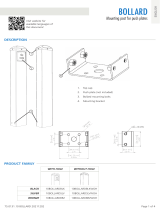Page is loading ...

MS31
75.5985.04 MS31 20230714 Page 1 of 4
TECHNICAL SPECIFICATIONS
Technology: microwave motion sensor
Radiated frequency: 24.125 GHz
Radiated power density: < 5 mW/cm2
Supply voltage:
to be operated from SELV-compatible
power supplies only
12 – 24 VAC ±10%
12 – 24 VDC +30% / -10%
Supply frequency: 50 – 60 Hz
Power consumption: < 1.5W
Output
relay contact rating (max. voltage):
relay contact rating (max. current):
Max. switching power:
relay with switch-over contact (voltage-free)
60 VDC / 125 VAC
1A (resistive)
30W DC / 60 VAC
Detection range: 4 – 24” (adjustable)
Detection mode: motion (bidirectional)
Output hold time: 0.5 – 30 sec
Temperature range: -4 – 131 °F (-20 – 55 °C)
Weight: 0.34 lbs
Material: PC, PE
IP rating: IP54
Certification: Electromagnetic compatibility (EMC) according to 2004/108/EC
FCC: G9B-210161
IC: 4680A-210161
Specifications are subject to change without prior notice.
All values measured in specific conditions.
SINGLE-GANGJAMB DOUBLE-GANG 6” ROUND
Visit website for
available languages of
this document.
Touchless-activation switch for automatic doors
ENGLISH
* must use adapter bracket
** not provided by BEA
MOUNTING BOX COMPATIBILITY
JAMB SINGLE-GANG DOUBLE-GANG 6” ROUND
SURFACE-MOUNT 10BOXJAMBST 10BOX24SGSM
10ABOXSGSMS
10BOXDGSM
10BOX475SQSM*
10BOX45SQSM*
10BOX6RNDSM*
FLUSH-MOUNT N/A standard, single-gang
electrical box**
standard, double-gang
electrical box**
10BOX45SQFM*
standard, single-gang
electrical box**

1
Page 2 of 4 75.5985.04 MS31 20230714
9When wiring multiple devices together to create a system configuration, it is best to ensure that each device works
independently. This will reduce troubleshooting if a discrepancy occurs.
9Prior to installing any equipment in either new or existing circuits, verify correct line voltage and line stability.
Always remember to shut off the power before performing circuit wiring.
9Do not place the sensor in the door’s opening range, where the sensor may see door movement.
9Do not place moving objects in front of the sensor.
9Do not use harsh cleaning agents to clean polycarbonate materials. Harsh cleaning agents (e.g. ammonia) can
cause damage to these materials. BEA recommends using clean, lukewarm water and a soft, lint-free cloth to
clean sensor windows and other polycarbonate surfaces on our products.
INSTALLATION TIPS
PRECAUTIONS
WIRING
Shut off all power going to header before attempting any wiring procedures.
Maintain a clean and safe environment when working in public areas.
Constantly be aware of pedestrian traffic around the door area.
Always stop pedestrian traffic through the doorway when performing tests that may result in unexpected reactions
by the door.
ESD (electrostatic discharge): Circuit boards are vulnerable to damage by electrostatic discharge. Before handling
any board, ensure you dissipate your body’s ESD charge.
Always check placement of all wiring before powering up to ensure that moving door parts will not catch any wires
and cause damage to equipment.
Ensure compliance with all applicable safety standards (i.e. ANSI A156.10) upon completion of installation.
DO NOT attempt any internal repair of the components. All repairs and/or component replacements must be
performed by BEA, Inc. Unauthorized disassembly or repair:
1. May jeopardize personal safety and may expose one to the risk of electrical shock.
2. May adversely affect the safe and reliable performance of the product resulting in a voided warranty.
Wire the MAGIC SWITCH to the door control according to the diagram shown here.
NOTE: Use either green (N.O.) or yellow (N.C.) wire, not both. Refer to the
door control manual to determine which must be used.
ACTIVATION
COMMON
12 – 24 VAC/VDC
12 – 24 VAC/VDC
GREEN
YELLOW
WHITE
RED
BLACK
Installer-provided
wire harness
MAGIC SWITCH
DOOR CONTROL

3
2
21 3 4
75.5985.04 MS31 20230714 Page 3 of 4
INSTALLATION
SET-UP
1. Install an electrical box.
If using a metal eletrical box, ensure that the sensor does not come in
contact with the box to avoid shorting the unit.
2. Clip the MAGIC SWITCH cube to the face plate.
3. Secure the face plate to the electrical box with the provided screws.
Four adjustments can be made to the sensor:
Sensitivity potentiometer: adjust detection field
from 4 to 24 inches (rotate clockwise to increase)
factory default: 4 inches (fully CCW)
Hold time potentiometer: adjust relay hold time
from 0.5 to 30 seconds (rotate clockwise to increase)
factory default: 0.5 sec (fully CCW)
Output Mode switch: determines Toggle mode or
Timer mode
- Toggle (switch up) = detection activates the relay
and the relay holds until a second detection
deactivates the relay (recommended for switch
applications)
- Timer (switch down, factory default) = detection
activates the relay for 0.5 to 30 seconds; relay will
hold as long as detection occurs
LED mode switch: determines if LED illuminates when in detection or when not in
detection
- switch up (factory default) = LED on when sensor is NOT in detection, LED off when in
detection
- switch down = LED on when sensor is is in detection, LED off when not in detection
gang box
(metal/plastic)
MAGIC SWITCH
assembly
1
2
3
4
Depending on the door installation, the weather-resistant foam gasket may be used.

Page 4 of 4 75.5985.04 MS31 20230714
BEA, Inc., the sensor manufacturer, cannot be held responsible for incorrect installations or incorrect adjustments of the sensor/device;
therefore, BEA, Inc. does not guarantee any use of the sensor/device outside of its intended purpose.
BEA, Inc. strongly recommends that installation and service technicians be AAADM-certifi ed for pedestrian doors, IDA-certifi ed for doors/
gates, and factory-trained for the type of door/gate system.
Installers and service personnel are responsible for executing a risk assessment following each installation/service performed, ensuring
that the sensor/device system performance is compliant with local, national, and international regulations, codes, and standards.
Once installation or service work is complete, a safety inspection of the door/gate shall be performed per the door/gate manufacturer’s
recommendations and/or per AAADM/ANSI/DASMA guidelines (where applicable) for best industry practices. Safety inspections must
be performed during each service call – examples of these safety inspections can be found on an AAADM safety information label (e.g.
ANSI/DASMA 102, ANSI/DASMA 107, UL294, UL325, and International Building Code).
Verify that all appropriate industry signage, warning labels, and placards are in place.
BEA, INC. INSTALLATION/SERVICE COMPLIANCE EXPECTATIONS
Tech Support & Customer Service: 1-800-523-2462
General Tech Questions: [email protected] | Tech Docs: www.BEAsensors.com
Door does not open when
swiping hand in front of
sensor
Bad or no power Check power supply. If LED switches on
or flashes, power connections are okay.
Detection range too short Adjust detection zone. Remove any metal
plates in front of sensor.
Incorrect wiring/connection Check wiring and relay connection.
Sensor stays in detection Environmental conditions
influencing sensor
Remove moving objects from around
sensor.
Wrong output mode Switch output mode to Timer.
Door remains open after
detection/activation
Wrong output mode Switch output mode to Timer.
Incorrect wiring/connection Check wiring and relay connection.
©BEA | Original Instructions | PLEASE KEEP FOR FURTHER USE - DESIGNED FOR COLOR PRINTING
FCC APPROVAL
This device complies with Part 15 of the FCC Rules and with RSS-210 of Industry Canada.
Operation is subject to the following two conditions:
*this device may not cause harmful interference, and
*this device must accept any interference received, including interference that may cause undesired operation.
This equipment has been tested and found to comply with the limits for a Class B digital device, pursuant to part 15 of the FCC Rules.
These limits are designed to provide reasonable protection against harmful interference in a residential installation. This equipment
generates, uses and can radiate radio frequency energy and, if not installed and used in accordance with the instructions, may cause
harmful interference to radio communications. However, there is no guarantee that interference will not occur in a particular installation.
If this equipment does cause harmful interference to radio or television reception, which can be determined by turning the equipment off
and on, the user is encouraged to try to correct the interference by one or more of the following measures:
*Reorient or relocate the receiving antenna
*Increase the separation between the equipment and receiver
*Connect the equipment into an outlet on a circuit different from that to which the receiver is connected
*Consult the dealer or an experienced radion/TV technician for help
WARNING: CHANGES OR MODIFICATIONS TO THIS EQUIPMENT NOT EXPRESSLY APPROVED BY BEA INC. MAY VOID THE FCC
AUTHORIZATION TO OPERATE THIS EQUIPMENT.
TROUBLESHOOTING
/


